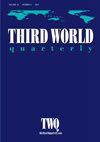构建世界导师:印度民族主义、民粹主义和纳伦德拉·莫迪全球形象的国内消费
IF 1.8
2区 经济学
Q2 DEVELOPMENT STUDIES
引用次数: 0
摘要
本文章由计算机程序翻译,如有差异,请以英文原文为准。
Constructing a Vishwaguru (world teacher): Hindu nationalism, populism and the domestic consumption of Narendra Modi’s global image
Abstract Narendra Modi is a prime example of a right-wing nationalist populist, in his case, trying to create a new India that rejects India’s traditional secular liberalism in favour of a Hindu state. Modi has gained a reputation amongst his supporters as a visionary who is improving India’s standing on the world stage as a great power and making a revolutionary change in India. But Modi has come under increasing international concern and condemnation for his majoritarian nationalist authoritarianism, which has seen India slide on many democracy indicators, a reality which his supporters reject. We argue, thus, that there is a fundamental discrepancy between the image of the Modi regime abroad and at home, that has gone unexplored in scholarship. We also contend that this discrepancy is implicated in post-truth politics. Modi’s populist project is one of asserting a true Hindu Indian identity, the global criticisms of which, under conditions of post-truth, are either irrelevant or, ironically, contribute to its strength.
求助全文
通过发布文献求助,成功后即可免费获取论文全文。
去求助
来源期刊

Third World Quarterly
DEVELOPMENT STUDIES-
CiteScore
4.10
自引率
15.00%
发文量
137
期刊介绍:
Third World Quarterly ( TWQ ) is the leading journal of scholarship and policy in the field of international studies. For almost four decades it has set the agenda of the global debate on development discourses. As the most influential academic journal covering the emerging worlds, TWQ is at the forefront of analysis and commentary on fundamental issues of global concern. TWQ examines all the issues that affect the many Third Worlds and is not averse to publishing provocative and exploratory articles, especially if they have the merit of opening up emerging areas of research that have not been given sufficient attention. TWQ is a peer-reviewed journal that looks beyond strict "development studies", providing an alternative and over-arching reflective analysis of micro-economic and grassroot efforts of development practitioners and planners. It furnishes expert insight into crucial issues before they impinge upon global media attention. TWQ acts as an almanac linking the academic terrains of the various contemporary area studies - African, Asian, Latin American and Middle Eastern - in an interdisciplinary manner with the publication of informative, innovative and investigative articles. Contributions are rigorously assessed by regional experts.
 求助内容:
求助内容: 应助结果提醒方式:
应助结果提醒方式:


